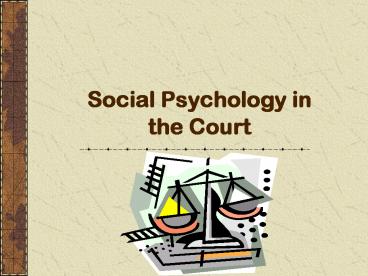Social Psychology in the Court - PowerPoint PPT Presentation
1 / 15
Title:
Social Psychology in the Court
Description:
Social Psychology in the Court. Announcements. Want to look over your exam? ... Social Psychology in the Court. Just how accurate is eyewitness testimony? ... – PowerPoint PPT presentation
Number of Views:604
Avg rating:3.0/5.0
Title: Social Psychology in the Court
1
Social Psychology in the Court
2
Announcements
- Want to look over your exam? See Elizabeth during
office hours (MW 10-12, UH 6506) or make an
appointment - Interested in research on childrens eyewitness
testimony? Contact Dr. London (kamala.london_at_utole
do.edu) to see if you can help in her lab!
3
Social Psychology in the Court
- Just how accurate is eyewitness testimony?
4
Three Stages of Memory
- Acquisition/encoding the process by which people
notice and attend to information in the
environment - Storage how information is stored and organized
in memory - Retrieval the process by which people recall the
information stored in memory
5
Stage 1 Problems with Acquisition
- What influences the information people encode
during a crime? - Arousal effects (salience effect) arousal
increases memory for salient details and
decreases memory for less noticeable details - Weapon focus
- Own race bias
6
Stage 1 Problems with Acquisition
- Expectancy effects
- Poor conditions
- Conclusion? We cant remember it if we dont
encode it and often we dont even encode the
information!
7
Stage 2 Two Models of Memory Storage
- Videotape Recorder Model people store an exact
memory of events - Reconstructive Memory Model people construct the
memory when asked - Evidence favors the reconstructive model!
8
Stage 2 Problems with Storage
- The power of leading questions (Loftus)
- stop sign vs. yield sign study
- contact vs. smashed study
- Misinformation effect misleading information
after the event may influence our memory of the
event
9
Stage 2 Problems with Storage
- Why does this occur?
- Source Monitoring Problem people fail to
remember the source of information, allowing
post-event misleading information to blend into
memory of event - After much repetition, info is stored and source
is forgotten - Apply to justice system
10
Stage 2 Problems with Storage
- Suggestibility of children Mousetrap study
- 58 had false memory of mousetrap
- Suggestibility of childhood memories
- 20 of adults had false memory
- Evidence for recovered memories
- May just be result of leading questions
11
Stage 2 Problems with Storage
- Conclusion
- Everything we remember may not have actually
happened - Also, gives tremendous power to the questioner
- How can we get the most accurate memories? Avoid
leading questions! - Was the subject wearing a blue shirt? vs. what
was the subject wearing?
12
Stage 3 Problems with Retrieval
- Forced Choice Problem if people are pressured to
make a choice (choose the suspect from a line up)
they will make a choice even if they have no
memory to support it and later will remember the
choice as an actual event. - Studies of blank line-ups
13
How do we decide when people are accurate
eyewitnesses?
- Confident witnesses are NOT more accurate!
- Why?
- Social pressure to be confident
- Repetition of testimony leads to confidence
- Some people just speak more confidently
- Conclusion we simply cant tell when people are
accurate!
14
Do juries attend to eyewitnesses?
- Juries far more likely to convict if there is an
eyewitness - 18 if no eyewitness
- 72 if eyewitness present
- Can juries tell who is accurate? NO!
- Juries assume more specific details more
accurate - BUT
- More specific details less accuracy about
important things!
15
Do juries attend to eyewitnesses?
- What if we tell juries to ignore eyewitness
testimony? - Perseverance bias
- Discredited eyewitness is better than no
eyewitness - When told no glasses, 68 still convicted based
on testimony































